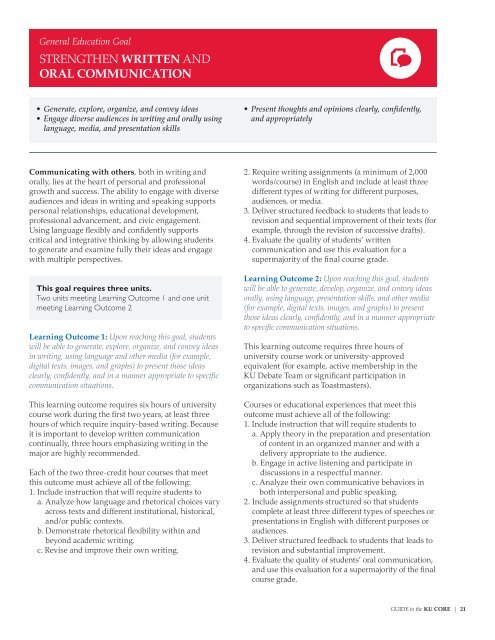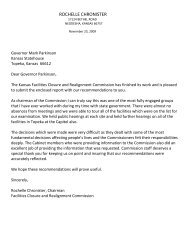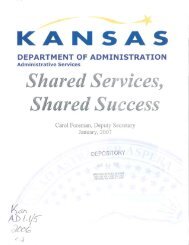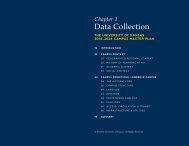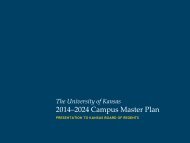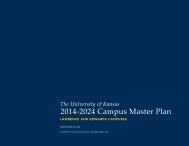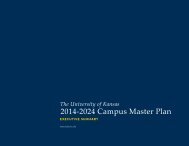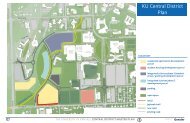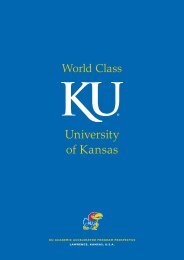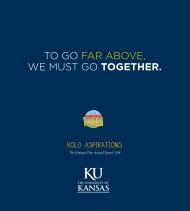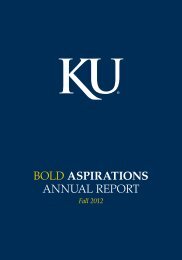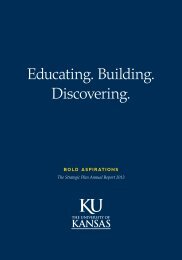Guide to the KU Core
Introduction to KU's first university-wide undergraduate curriculum, prepared for faculty, department chairs, and students.
Introduction to KU's first university-wide undergraduate curriculum, prepared for faculty, department chairs, and students.
Create successful ePaper yourself
Turn your PDF publications into a flip-book with our unique Google optimized e-Paper software.
General Education Goal<br />
Streng<strong>the</strong>n written and<br />
oral communication<br />
• Generate, explore, organize, and convey ideas<br />
• Engage diverse audiences in writing and orally using<br />
language, media, and presentation skills<br />
• Present thoughts and opinions clearly, confidently,<br />
and appropriately<br />
Communicating with o<strong>the</strong>rs, both in writing and<br />
orally, lies at <strong>the</strong> heart of personal and professional<br />
growth and success. The ability <strong>to</strong> engage with diverse<br />
audiences and ideas in writing and speaking supports<br />
personal relationships, educational development,<br />
professional advancement, and civic engagement.<br />
Using language flexibly and confidently supports<br />
critical and integrative thinking by allowing students<br />
<strong>to</strong> generate and examine fully <strong>the</strong>ir ideas and engage<br />
with multiple perspectives.<br />
This goal requires three units.<br />
Two units meeting Learning Outcome 1 and one unit<br />
meeting Learning Outcome 2<br />
Learning Outcome 1: Upon reaching this goal, students<br />
will be able <strong>to</strong> generate, explore, organize, and convey ideas<br />
in writing, using language and o<strong>the</strong>r media (for example,<br />
digital texts, images, and graphs) <strong>to</strong> present those ideas<br />
clearly, confidently, and in a manner appropriate <strong>to</strong> specific<br />
communication situations.<br />
This learning outcome requires six hours of university<br />
course work during <strong>the</strong> first two years, at least three<br />
hours of which require inquiry-based writing. Because<br />
it is important <strong>to</strong> develop written communication<br />
continually, three hours emphasizing writing in <strong>the</strong><br />
major are highly recommended.<br />
Each of <strong>the</strong> two three-credit hour courses that meet<br />
this outcome must achieve all of <strong>the</strong> following:<br />
1. Include instruction that will require students <strong>to</strong><br />
a. Analyze how language and rhe<strong>to</strong>rical choices vary<br />
across texts and different institutional, his<strong>to</strong>rical,<br />
and/or public contexts.<br />
b. Demonstrate rhe<strong>to</strong>rical flexibility within and<br />
beyond academic writing.<br />
c. Revise and improve <strong>the</strong>ir own writing.<br />
2. Require writing assignments (a minimum of 2,000<br />
words/course) in English and include at least three<br />
different types of writing for different purposes,<br />
audiences, or media.<br />
3. Deliver structured feedback <strong>to</strong> students that leads <strong>to</strong><br />
revision and sequential improvement of <strong>the</strong>ir texts (for<br />
example, through <strong>the</strong> revision of successive drafts).<br />
4. Evaluate <strong>the</strong> quality of students’ written<br />
communication and use this evaluation for a<br />
supermajority of <strong>the</strong> final course grade.<br />
Learning Outcome 2: Upon reaching this goal, students<br />
will be able <strong>to</strong> generate, develop, organize, and convey ideas<br />
orally, using language, presentation skills, and o<strong>the</strong>r media<br />
(for example, digital texts, images, and graphs) <strong>to</strong> present<br />
those ideas clearly, confidently, and in a manner appropriate<br />
<strong>to</strong> specific communication situations.<br />
This learning outcome requires three hours of<br />
university course work or university-approved<br />
equivalent (for example, active membership in <strong>the</strong><br />
<strong>KU</strong> Debate Team or significant participation in<br />
organizations such as Toastmasters).<br />
Courses or educational experiences that meet this<br />
outcome must achieve all of <strong>the</strong> following:<br />
1. Include instruction that will require students <strong>to</strong><br />
a. Apply <strong>the</strong>ory in <strong>the</strong> preparation and presentation<br />
of content in an organized manner and with a<br />
delivery appropriate <strong>to</strong> <strong>the</strong> audience.<br />
b. Engage in active listening and participate in<br />
discussions in a respectful manner.<br />
c. Analyze <strong>the</strong>ir own communicative behaviors in<br />
both interpersonal and public speaking.<br />
2. Include assignments structured so that students<br />
complete at least three different types of speeches or<br />
presentations in English with different purposes or<br />
audiences.<br />
3. Deliver structured feedback <strong>to</strong> students that leads <strong>to</strong><br />
revision and substantial improvement.<br />
4. Evaluate <strong>the</strong> quality of students’ oral communication,<br />
and use this evaluation for a supermajority of <strong>the</strong> final<br />
course grade.<br />
GUIDE <strong>to</strong> <strong>the</strong> <strong>KU</strong> <strong>Core</strong> | 21


